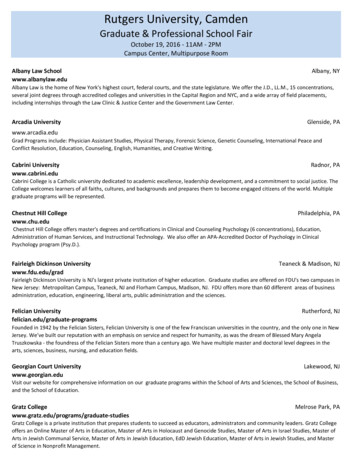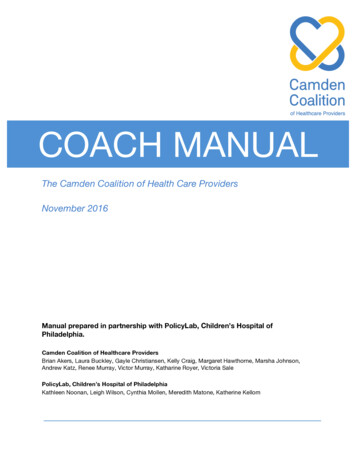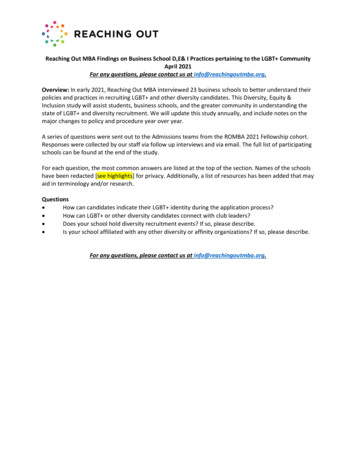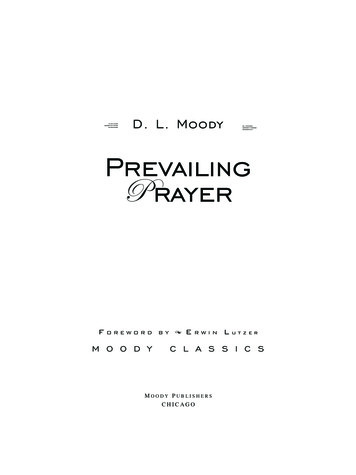Transcription
First Congregational ChurchCamden, MaineFebruary 2021Vol. 37, No 2REACHING FOR THE HEAVENS A Steeple Story for the Generations In the fall of 2018 a few of us as Trustees were talking in the parkinglot, and we saw a few dark spots on the ribbing of the steeple's spire.We didn't yet know what we were looking at – but we knew it was goingto need our attention. Through conscientious exploration we now havethe knowledge to proceed with the repair and the contractor who will doit with care – subject to your approval of the budget at the AnnualMeeting. If you haven't read the Steeple Report by the Chair of Trusteesin the annual report, please do, as it gives the full extent of our preparations.This project has been developed and reviewed with Cabinet and involves our choosing one of three options for this repair. Option 1 wassimply to patch and repaint the steeple. Our last repainting was in 2012and barely lasted 8 years. Option 2 was to sheathe the entire steeple andspire with composite materials that will last between 50 and 100 years.Option 3 was to replace the entire steeple and was deemed unnecessaryby the experts we consulted. We have chosen Option 2 and stronglyrecommend that this project be done NOW so that we do not run the riskof suffering additional expense if weather were to get into the steepleand cause rot or interior deterioration. This would also impact our leasewith Verizon which produces 27,000 a year for us.The cost for the steeple is expected to be 319,000 plus contingencyfunds of an additional 40,000. In light of the many difficulties broughtto our community by COVID, including financial issues as well as emotional ones, we are especially grateful that careful financial managementand the generous care and concern of all those who came before us haveprovided us with our existing unrestricted reserve funds and our endowment funds. At this time we are recommending that we pay in full forthis steeple project out of the unrestricted reserve funds as well as usesome income from our endowment. It is our intention to establish aSteeple Fund and campaign over the next three years to raise fundswhich will then replenish at least half of the funds we take out for thisproject.(this Steeple Story continues with pictures, pp 12-13)1
From the Pastor’s DeskRev. Dr. Ute S. MolitorBrave Space – Thoughts on Dialogueand the Invitation of LentDuring these times of laser-sharp division in our country and also closerto home, I have been impressed by all the efforts to seek to bridge thedivide not only around politics but also the racial divide. A number ofpeople wo participated in the Camden Area Conversations on Race arenow trying to see how we can affect racial justice in our state. Many ofthose who were part of the course on White Privilege are doing the sameand I will keep you posted about developments. In mid-January, I wasalso invited to participate in the Camden Rotary meeting. The Club ishoping to become one of the official Peace Builder Clubs within the international Rotary Community. They invited Steve Becton from the organization “Facing History and Ourselves” (www.facinghistory.org) tospeak. He shared about the wide-ranging work of his organization whichdraws on history to learn lessons for today. They primarily work withschools and, among other things, teach students and adults how to haveeffective and peaceful conversations about difficult topics. Mr. Becton isan African American man who has led difficult discussions around racialissues in Tennessee like the removal or retention of confederate statues,to give just one example.His presentation at the Rotary meeting was a helpful reminder that we allcarry biases in our perception of each other. This includes implicit biasabout individuals based on external characteristics and group affiliations(race, ethnicity, gender, political affiliation, etc.). This remains largelyunconscious but holds a lot of power. He also urged us to remember thatdespite all our biases and divisions, there is a lot of room for dialogueand good will. I was particularly struck by the reminder that the largestsector of our population is actually not found at the extreme ends of thespectrum of divisions but in between. The majority still wants to find away forward. We can focus our efforts there to begin to bridge our divides and not let the conversation be hijacked by folks who are not interested in learning and growing together.The conversations begin by asking people to share their greatest hopesand dreams for the community. This always humanizes the experienceand eases reactivity. The topic at the heart of the conversation is thenengaged in relation to these hopes and dreams. Becton also talks withpeople about the importance of creating “brave space” together. Thosewho are not ready for that or not interested in it are invited to take theirleave, at least for now. Those who stay commit to creating brave spacetogether.2
Here is how the poet Micky ScottBey Jones has described whatbrave space means:Together we will create brave space.Because there is no such thing as a “safe space” —We exist in the real world.We all carry scars and we have all caused wounds.In this spaceWe seek to turn down the volume of the outside world,We amplify voices that fight to be heard elsewhere,We call each other to more truth and love.We have the right to start somewhere and continue to grow.We have the responsibility to examine what we think we know.We will not be perfect.This space will not be perfect.It will not always be what we wish it to be.ButIt will be our brave space together,andWe will work on it side by side.I wonder how these words resonate for you? I find a depth and truth inthem that exceeds the context of wider community conversations. Arethere people in your life with whom you may disagree but who might beopen to exploring this notion of brave space with you? Are you aware ofthe scars you carry and how they influence how you approach a given topic or challenge? Do you know what gives you a sense of internal safetythat will not totally depend in what other people are doing or saying? Canyou be gentle with yourself or another with whom you are speaking, remembering that we all need to start somewhere? What deeper truth andlove is God calling you, us, toward at this time also as a church?These are also relevant questions as we enter the season of Lent later thismonth. The word Lent is related to the lengthening of days on the journeytoward spring. Lent has traditionally been a time in the church when wemake ourselves vulnerable before God. We ask for the grace to see wherewe have been blind in our thoughts, words and deeds. We journey withChrist into the shadow of his passion on the cross as the resistance to hisamazing love leads to his killing. We also journey with Christ toward thelengthening of the light, toward resurrection and renewal. Let us pray thatour hearts’ own reach may lengthen as we extend ourselves out into theworld despite the divides that burden us. I invite us all to imagine thatGod is inviting us into brave space with God, working within us and sideby side as we seek to grow and ask for grace. This is true for dealing withour personal contradictions and struggles as well as those of our sharedlives. God won’t get up and leave. God knows this won’t be perfect andpromises to take even our stumblings and turn them into dance steps. Mayit be so for us individually and communally.With great hope, Ute3
Announcing this Year's Lenten Study:The Universal Christ by Richard RohrThe subtitle of Rohr's book is: "How a ForgottenReality Can Change Everything We See, Hope For,and Believe." Drawing from the diverse Christiantradition, Rohr invites us on a journey of reimagining who Christ is and thereby who we are.Christ is not Jesus' last name though we say that we discoverChrist in Jesus in particular form. We experience in Jesus as theChrist the blueprint for what it means to live a human life as anexpression of the divine outpouring of creative energy. And thereis an even more universal dimension to understanding Christ.Wherever divine energy and matter converge, the Christ becomesmanifest. Rohr writes that God loves things by becoming them andinfuses all life with the presence of Christ. This Christ energy in uscan be bound or thwarted or it can flow freely and creatively. Someof this depends on our vision of who God is and expresses God'sself. The Universal Christ is a book that can indeed engage us in alife changing paradigm shift of understanding.This will not simply be an intellectual discussion about an interesting book. Our sharing will include personal reflection, group reflection as well as optional brief worship (prayer and shared silence). Given the pandemic, all meetings will be via zoom. Unfortunately, we will not gather for our usual Lenten soup dinners.We will meet on Thursdays from 5:30-7:00 pm:February 25, March 4, March 11, March 18, March 25 andpossibly additional dates after Easter depending on interest.Please go and explore the special websitewww.universalchrist.org where you can find videos, podcasts andother helpful resources on the Universal Christ. Participants areasked to buy their own copies of the book. Please register withBecky at becky@camdenucc.org. I look forward to exploring thisamazing book and its implications for our lives together with you!UteUte begins her Mindfulness Meditation Teacher TrainingI (Ute) will begin a two year continuing education trainingprogram this February. This program is led by clinical psychologist and Mindfulness teachers Tara Brach and JackKornfield. I have been following both teachers for years via4
books, podcasts and on-line offerings. Their breadth ofknowledge is inclusive of the wisdom of many faith traditions.The goal of the program is to learn how to introduce people to themeaning, practice, health benefits and other growth potential provided by mindfulness practice. The program includes teachingsfrom many other leaders in the field and is accompanied by mentors. I will be participating in a small group on-line throughoutthe program to process teaching materials and assignments. During the second year, I will be expected to offer a program to thecommunity and/or church and hope that this will provide our ownmembers with helpful tools for staying grounded, especially inanxiety laden times. I trust this learning will also serve as positiveoutreach and support to other people in the wider community. Iappreciate your support as I begin this journey. My first of twoweekend retreats will be February 19-21. This year’s retreat willbe on-line due to the pandemic.Scout Sunday on February 21This year, Scout Sunday will be entirely lay-led by deacon andScout master Ed Weber and members of the Troop. Don’t missthis opportunity to celebrate the beauty of creation, learn aboutscout values from a perspective of faith while worshipping ourliving God. A big thank you to Ed Weber, Troop 200, and all thescouts who will be participating.MESOM- Maine School of TheologyDid you know that our Maine UCC Conference has a School ofTheology? It is the successor of Bangor Theological Schoolwhich no longer exists. MESOM offers fall and spring courses onspiritual formation, Bible, Theology, leadership and so muchmore. It assists students who are pursuing ordained ministrythrough alternative pathways, offers continuing education programs for pastors but is welcoming of all people who are seekingspiritual and educational enrichment. assists students. You maywant to sign up for one of the courses. Check out the Facebookpage: https://www.facebook.com/maineconference.org/ or go tothe Maine conference website for more information atwww.maineucc.org.5
From Matt MainsterDirector of MusicSo - good news on the music front, everybody––we WILL haveour Friends of Music concert series this year! The first three concerts are being recorded specially for us by our artists, to be sharedvirtually on Youtube (with links posted on our Facebook page andin our church newsletter). The last four concerts will be in person ifpossible, and we will confirm this as early as possible.Our full concert poster with pictures and descriptions will be sharedsoon, but in the meantime here’s our 2021 lineup:March 21st: Aaron Larget Caplan (guitar)April 18th: Gail Archer (organ)May 16th: Borzowski Family Trio (piano, violin, cello)Sept 12th: Edgewater Duo (piano and clarinet)Sept 26th: Duo YUMENO (cello and koto)October 17th: David Rogers (guitar)Dec 3rd: Christmas by the Sea (variety concert)*We will cross our fingers that ourannual “choir fest” can return in 2021!*We hope you will take advantage of each of our FREE concerts thisyear, ensuring that music remains alive and well even during a pandemic. To make a donation to the Friends of Music concert series,please mail a check to the church office for “Friends of Music”, ORvisit the church webpage at www.camdenucc.org. From there youcan click the “donate” button and enter your desired donation intothe “Friends of Music” column (see pictures below). Our usual subscription letter will be emailed to current subscribers within thenext few weeks. Many thanks in advance for your support! We areproud to lend that support to musicians during this difficult time,and to provide uplifting music to our church and community.With excitement for the year ahead,Matt6
From Heavenly ThreadsMelissa Chapman, Manager &Beth Gerrish, Assistant ManagerHeavenly Threads Thrift Shopre-opened onThursday January 21, 2021.After a thorough cleaning, ourstaff created some awesome displays with lots of new merchandise. And our loyal shoppers weredelighted with it all!The shop is open to customersWednesday-Saturday 12 –3 pm.We accept donations all day onTuesday 10-3, & WednesdaySaturday mornings 9-11. If youhave any questions just give us acall at 236-3203.7
Shields Mission Project AdministratorJeanne DennyThe Art of CommunicationWe all say we want open communication, but are we prepared tochange our behaviors so that such communication can takeplace? Often we expect the other person to change his/herbehavior, but in the words of the Serenity Prayer:God grant me the serenityTo accept the things I cannot change;Courage to change the things I can:And wisdom to know the difference.Here are some thoughts/ideas to assist you in staying open andcompassionate. While we usually have the best of intentions,most of us struggle to communicate compassionately because weare culturally conditioned to be adversarial. We tend to assumethat others are out to criticize or exploit us; we come to the discussion prepared to attack, belittle, criticize, often withoutconscious intent.In order to enhance open communication, we need to:Ask clarifying questions to understand another’s point ofview AND be willing to listen to the answer, especiallyif it is unexpected. Too often we ask questions to fitthe social situation, but don’t really want to know howthe other person feels or what might be needed.Be respectful of the other, even when one disagrees. Onedoes not need to submissive, but be willing to engage indiscussion that respects both parties. Talk to each otherfrom an equal footing.Be open to ideas and suggestions that are not compatiblewith one’s own. Be appr eciative of alter native per spectives, especially when offered from a caring place,an open heart.8
Avoid telling the other how he should feel. This denies theother’s perspective and usually is code for “I don’t want youto do that because it makes me feel uncomfortable.”Try not to make decisions for others. We all like to be activeparticipants in the decision-making process and it is helpfulto know that one has choices.Try not to assume that your preferred way is the right way.Be willing to let go of control and the need to win. Oftencollaboration and cooperation foster a stronger relationshipand a more comprehensive solution.And when in doubt as to what to do or how to proceed, be sure toreference A ll I Really Need to Know I Learned in Kindergarten byRobert Fulghum!May you have a peaceful and healthy 2021!Warm regards, jeanneNote: when emailing me, please use the jeanne@camdenucc.or g whenseeking Shields information. [If you are trying to contact me about personal messages, please use my personal email, Jeanneofcamden@gmail.com.It will help me process my email more efficiently.]Shields Committee: Deb Endl (Chair), Betty Bates, JulianneEdmondson, Jean Forest, Rich Stuart, Debbi Hitchings, Claudia Griffiths,Jeanne Denny (Administrator)LECTIO DIVINA MEDITATION EVERY TUESDAY, 8 amThe Tuesday hour of Lectio practice, that originated in the church, hastaken on an extra significance during the Covid-19 as we meet togetherweekly via Zoom at 8 AM. It is an hour of shared sacred readings andreflections, drawn from various sources. In reading the texts aloud threetimes, we often find a new heart connection to them. We rotate leadership in selecting the texts, as participants are interested and willing. Wehave found that the time of quiet contemplation together is a deeplygrounding and peaceful way to enter the day. It has become a verymeaningful hour in our week and welcome any who would like to join.To be added to the Zoom invitation list please contact the church office236-4821, becky@camdenucc.org9
FROM YOUR CARE TEAMRich Stuart: Helpful Information on DepressionThe hours of daylight are lengthening. And here we are: together “wading through” thelong pandemic winter in our “safe pods,” in Zooms, FaceTimes, calls and texts. Eachday brings more light, more people being vaccinated, more leadership, and more hope.Spring will come.But, yes, separation, isolation, suffering continue. “Covid fatigue” is real, as are anxietyand depression. And, we may simultaneously find ourselves challenged by illness,grief over loss and/or other life trauma. In the January BEACON, Rich Stuart sharedimportant information on anxiety, We again turn to Rich Stuart to help us understandabout depression - its forms, how to recognize, what to do.As background, Rich Stuart is a practicing psychotherapist and licensed clinical socialworker. A 40-year FCC member, Rich holds two masters, has been a clinical socialworker for over 18 years at PenBay Medical Center’s Psychiatric and Addiction Unit;was a psychotherapist and crisis clinician at Acadia Hospital, and a psychotherapist atHealthreach Network and Midcoast Mental Health Center. Currently he is a volunteerpsychotherapist at The Knox Health Clinic, and has several decades of counseling experience and wisdom. Rich provided your Care Team with a helpful overview of depression, which is summarized below.Depression can be mild to severe. “The Blues” may be triggered by events such asCovid worry, illness, job loss, grief, and loneliness. It may be intermittent or longlasting, but non-clinical, and usually doesn’t involve professional intervention. However, if a person does not bounce back, and their depressive symptoms reach the levelcausing severe distress and an inability to function adequately in one’s daily life, thisdepressive episode is usually diagnosed as a clinical depressive disorder. At this stage,medical intervention and/or counseling is recommended. For both mild and clinicaldepression there are many small but important non-medical interventions for relieffrom depressive symptoms.Clinical depressive disorders have a broad spectrum of severity, ranging from lowgrade to severe depression. Mild clinical depressive disorders, such as Recurrent BriefDepression, are characterized by impaired functioning and distress in one’s life, butlacking the depressive symptoms of the more severe types of depression, such as MajorDepressive Disorder and Persistent Depressive Disorder (Dysthymia). Major Depressive Disorder often includes suicidal thinking, possible suicidal plan and/or attemptedsuicide. This level of depression with suicidality often requires psychiatric hospitalization and/or a short interval of intensive outpatient treatment as aftercare treatment withlong term individual psychotherapy to follow. Some other symptoms in this disordermay include a loss of pleasure and interest, hopelessness, insomnia or hypersomnia,loss or gain in weight, feelings of worthlessness, isolation, loss of energy and fatigue,concentration and thinking issues, and substance abuse. Dysthymia, though less severethan Major Depression, is nonetheless very debilitating, with fewer major depressivesymptoms, does not meet criteria for hospitalization, requires depression for at leasttwo years in adults, and 1 year in children and adolescents. Seasonal Affective Disorderis quite prevalent as well, especially in colder climates. There are depressive disorders induced by medical conditions, such as untreated thyroid disease, stroke and heartdisease, reactions to prescribed medications, and substance-induced depressions. Therecan be other serious symptoms from depression, such as psychomotor problems10
(slowing of speech and mobility), psychotic symptoms (i.e., hallucinations and delusions), eating disorders, bodily aches and pains, sadness, and irritability. Those suffering from non-clinical depression will experience milder symptoms of depression,such as sleep difficulties, sadness, irritability, and some distress in one’s life, but notreach the level of a diagnosed depressive disorder.Why does clinical depression occur? It may occur to only one child of several childrenin a family, or to only one adult in a family. Research has shown generally that in clinically diagnosed depression, there is a genetic component. Genetics combined withstressful situations can trigger a depressive episode.To understand recovery from depression, it helps to have a basic familiarity with theneurobiology of depression. Certain structures in our limbic system located in thefrontal cortex of our brains regulate symptoms of depression. The limbic system relieson proper stimulation of several types of neurotransmitter (most importantly-serotoninand norepinephrine). These neurotransmitters are hormones that are sent to the limbicsystem from various parts of our body through neuropathways in our autonomic nervous system. When one is depressed, there is a lack of flow of neurotransmitters reaching the limbic system. The limbic system then starts the process of creating depressivesymptoms. Thus, the major process of recovery depends on finding treatments to enhance the flow of these neurotransmitters to the limbic system.Proper treatment of depression is through both medical and non-medical interventions. If depression has reached a serious level where daily functioning is severelyimpaired, then the first step is to be evaluated by a physician for a physical examination. There are times that psychotherapy may be sufficient for recovery. Often an antidepressant medication, such as Zoloft, Citalopram, or Effexor may be prescribed by afamily physician or psychiatrist. Medication intervention facilitates recovery by stimulating an increased flow of these neurotransmitters to the limbic system. For the mostserious cases, hospitalization may be necessary. Some extreme forms of depression donot respond well to these treatments, and more invasive treatments such as ElectroConvulsive Therapy (ECT), Vagal Nerve Stimulation, and Transcranial Magnetic Stimulation (TMS) may be utilized, but these approaches are usually a last resort.Non-medical interventions are also important to recovery from both mild, non-clinicaldepression and clinical depression because they help to generate a greater flow of Serotonin and Norepinephrine especially, to the limbic system in the brain. A balanceddiet (high in such foods as dairy products, spinach, chicken, turkey, soy, fish, nuts,kale), vigorous exercise, yoga, meditation, prayer, socialization with family andfriends, Zooming to church and other groups are all helpful in relieving mood problems because they help to stimulate the flow of these neurotransmitters to the brain.Put into practice the three A’s of recovery: Awareness, Acceptance, and Action, andtry to reframe Negative thinking into Positive Self-Talk. There are other alternativeinterventions (listed in the January BEACON) which are helpful in dealing with feelings of anxiety and depression.To understand and accept our feelings of depression, whether mild or clinical, is animportant first step. Be preemptive and talk about your depression. Discuss feelings ofdepression with your partner and/or good friends. Sharing those feelings is importantfor recovery. Remember that depressive episodes will usually pass with the propertreatment, whether dealing with non-clinical or clinical depression.11
REACHING FOR THE HEAVENS—A Steeple Story(cont. from cover page)In many ways your Trustees wish that this expenditure wasn't necessaryand that the church had never changed its original building. The 1799meeting house eventually led to the formation of our church in that building in 1805. And in 1834 our present sanctuary was constructed with itsbell tower but no large steeple or spire.But as both the community and the church grew, height became a way tokeep an eye to the heavens. Vertical spires lifted us up. They became anavigational aid, both literally and figuratively, leading to a place ofsecurity and hope for the community. The architecture of the NewEngland Protestant Church followed the architectural designs of Bullfinch, Gibbs, Wren, and Benjaminwhere verticality added harmony.Our church community stepped upto make needed repairs in 18701872 and added the steeple andspire at that time. For those of uswho have been up and in our steeple and spire, it is a thing of beauty,built by men whom we believewere shipwrights and master carpenters.This is the same steeple we havenow and which we need to protect,just as it has been protected overthe last 148 years by successivecongregations which knew of itsimportance as a community symbolin Camden.12
The church underwent extensive renovations in 1925 when it became awhite New England church. Photographer Steve Rosenthal wrote abook “White on White, Churches of Rural New England” in which hesays “Collectively they are as important to the cultural and architecturalhistory of these villages as are the great cathedrals to the cities of Europe. Regardless of one's religious persuasion, one cannot help but bemoved by their presence, as they are a part of all of us.”So now it is our turn. Our steeple andspire have served as a beacon over allthese years to lead one to our churchand to the work that we do to offer spirituality, hope, security, and openness toour community.We have established a committee of 9members and friends to lead this 3-yearcampaign, and we look forward to getting back to you shortly with plans ofeffective opportunities for us all toparticipate in this endeavor over thenext 3 years.I wish that there was a real potof gold at the end of this rainbow. But I do believe that Godwas telling us that there is goldwithin the heart of this community and that with hard workand a commitment to our futurethat we will continue to serveas a beacon in our Camdencommunity, both literally andfiguratively.Thank you. And you will behearing from us.John HufnagelChair of Trustees13
142821ScoutSunday22Presidents’Day238 am Lectio Divina4:15 pm Cabinet168 am Lectio Divina3 pm Care Team125Fri249:30 am Staff9:30 am StaffNoon Prayer Shawls5:30-7 pm RohrBook Study #125182619ShieldsNoon Prayer Shawls 12:30 pm11Noon Prayer Shawls4ThuWEDNESDAY Noon Prayer Shawls 9 am Outreach17 ASH1539:30 am StaffNoon - LovingKindnesssMeditation7 pm CCE14Valentine’sDay28 am Lectio Divina1Wed89105 pm Steeple 8 am Lectio Divina9:30 am StaffMtg4 pm Communications4:45 pm MembershipTueMon7SunFEBRUARY 20212720136Sat
Stay in touch with our weekly electronic messages:FRIDAYS Message from Ute with Zoom Worshipinvitation# for Sunday, and ONE link includedto download/print combined worship bulletinand weekly newsletterThe church will remain closed until such time as our state government,the Maine CDC and our wider church indicate it is safe to reopen.Our Weekly Spiritual Practices are on ZoomTo be added to the invitation list please contactbecky@camdenucc.orgLectio DivinaMeditation on Tuesdays at 8 am (new time)Loving Kindness F eb. 3 at noonFEBRUARY BIRTHDAYS TO 2/202/222/232/242/27Bonnie WhiteRick BresnahanMelvin AchornShelley MillsJulianne EdmondsonMaryEllen OstherrBob StiehlerElizabeth LallyLisa DurkeeSteve WestonTony BatesMichael GriffithsIsaac and EileenGarcia YoungRich StuartJudy CucinottaAnnie BradyCian LallyJane SigsbeeAnn RaffertyJill RobertsNan HaidCARE TEAM TO PROVIDE A NEW FEATURE INTHE BEACONAs often as possible, we will strive to address helpful thoughts andresources in this publication on doing the best we can to staysafe during this stressful and continuing pandemic time.15
16Check out our website: www.camdenucc.orgE-mail the Church Office at churchoffice@camdenucc.orgCall the Church Office at 207.236.4821, Monday through Friday, 8:30-3:30pmTO CONTACT US:We are an Open and Affirming Congregation embracing diversityand affirming the worth and dignity of every person.We welcome everyone to share in all aspects of our church life.O U R M I SSI O N & V I SIO NGrowing in Faith, Centered in Christ, Committed to CommunityF IR ST C O NGR E GA TIO NAL C HU R CH O F C A MDE NAn Open & Affirming Congregation of the United Church of ChristADDRESS SERVICE REQUESTEDFirst Congregational Church55 Elm StreetCamden, ME 04843
expression of the divine outpouring of creative energy. And there is an even more universal dimension to understanding Christ. Wherever divine energy and matter converge, the Christ becomes manifest. Rohr writes that God loves things by becoming them and infuses all life with the presence of Christ. This Christ energy in us










